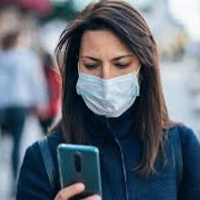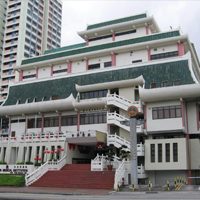COVID-19 Related Research
When COVID-19 first hit, almost immediately the School of Public Health at the UofM responded by spearheading crucial research initiatives. Collaboration was key, so contributors came from both inside and outside the School of Public Health. The focus of discovery has been wide ranging, from antibody testing that informs how and when the most vulnerable should receive vaccines to a study on the detrimental effects COVID has on mental health.
 Community Engagement Alliance (CEAL) Against COVID-19 Disparities
Community Engagement Alliance (CEAL) Against COVID-19 Disparities
Latrice Pichon
PIs (sub-awards): Latrice C. Pichon, PhD, MPH, Fawaz Mzayek, PhD (Parent Award: PI Juarez, Paul)
Funded By: NIH/NIMHD/NHLBI
Overview: Focus on COVID-19 awareness and education research among African Americans and Hispanics/Latinos
accounting for over half of all reported cases in the United States. Promote and facilitate
the inclusion and participation of these groups in vaccine and therapeutic clinical
trials to prevent and treat the disease.
The Impact of the COVID-19 Pandemic on Racial, Gender, and Socioeconomic Disparities in Access to Care and Health Outcomes Among Patients with Ambulatory Care Sensitive Conditions
Aram Dobalian
PIs: Aram Dobalian, PHD, JD, MPH, Satya Surbhi, PhD, MS, B.Pharm
Co-Is: Courtnee Melton-Fant, PhD, Paige Powell, PhD, MHA, James E. Bailey, MD, MPH
Funded By: CORNET grant: 2020 University of Tennessee Health Science Center (UTHSC)/University
of Memphis (UofM) SARS-CoV-2/COVID-19 Research CORNET grant
Overview: This quasi-experimental study is (1) examining the impact of the COVID-19 pandemic
on racial, ethnic, gender, and socioeconomic disparities in access to care and health
outcomes, and (2) evaluating the effect of reductions in elective surgeries and procedures
on cardiovascular disease (CVD) events and mortality among adult patients with ambulatory
care sensitive conditions residing in the Mid-South region of the US. Additionally,
we are examining whether CVD outcomes, CVD-related mortality, and overall mortality
varies based on health systems factors for these vulnerable patient populations.
Changes in Healthcare Utilization, Spending, and Perceived Health during COVID-19: A Longitudinal Study from Singapore
SangNam Ahn
Overview: Dr. SangNam Ahn works on a manuscript project to examine the association of the COVID-19
pandemic with healthcare utilization, out-of-pocket medical costs, and perceived health
status in Singapore. Using the individual-level monthly panel data (2018-2020), Dr.
Ahn and his colleagues (Drs. Seonghoon Kim and Kanghyock Koh) found that COVID-19
was associated with a decrease in doctor visits by 9.3 percentage points but an increase
in depressive symptoms by 2.8 percentage points. Dr. Ahn concludes that it is imperative
to monitor COVID-19’s long-term health effects among non-COVID-19 patients since study
findings indicated delayed healthcare and worsened mental health related to the outbreak.
The working paper is available at papers.ssrn.com/sol3/papers.cfm?abstract_id=3669090.
Impact of COVID-19 ‘Stay-at-Home’ Policy on Air Quality
Chunrong Jia
Collaborators: Debra Bartelli (UofM SPH) and Larry Smith (Shelby County Health Department)
Overview: A published study comparing concentration levels for air pollutants during Shelby
County’s lockdown to the same period from the past three years.
Publication: Jia, C.; Fu, X.; Bartelli, D.; Smith, L. Insignificant Impact of the “Stay-At-Home”
Order on Ambient Air Quality in the Memphis Metropolitan Area, U.S.A. Atmosphere 2020, 11,
630. Media coverage is available here: wknofm.org/post/streets-cleared-air-did-not
COVID-19 Antibody Test in Shelby County
Xinhua Yu
Overview: Collaborating with Dr. Manoj Jain and working with Christ Community Health Centers,
funded by the City of Memphis. This study will conduct a targeted seroprevalence survey
of minority populations throughout Shelby County to estimate the prevalence of COVID-19
and to understand health disparities during the COVID-19 pandemic. Findings will provide
insight into community SARS-CoV-2 infection rates and will help design optimal intervention
strategies and vaccine distributions in vulnerable populations.
Publications:
- Yu X. Health service inequalities during the COVID-19 pandemic among elderly people living in large urban and non-urban areas in Florida, US. Sage Open Medicine (in press). 2020
- Yu X. Modelling the return of the Modeling Return of the Epidemic: Impact of Population Structure, Asymptomatic Infection, Case Importation and Personal Contacts. Travel Med Infect Dis. 2020 Sep-Oct;37:101858. doi: 10.1016/j.tmaid.2020.101858. Epub 2020 Aug 27.
- Yu X. Impact of mitigating interventions and temperature on the instantaneous reproduction number in the COVID-19 pandemic among 30 US metropolitan areas. One Health. 2020 Dec;10:100160. doi: 10.1016/j.onehlt.2020.100160. Epub 2020 Aug 22.
- Yu X. Risk Interactions of Coronavirus Infection across Age Groups After the Peak of COVID-19 Epidemic. Int. J. Environ. Res. Public Health 2020, 17
- Yu X, Duan J, Jiang Y, Zhang H. Distinctive trajectories of COVID-19 epidemic by age and gender: a retrospective modeling of the epidemic in South Korea [published online ahead of print, 2020 Jul 2]. Int J Infect Dis. 2020;S1201-9712(20)30536-1. doi:10.1016/j.ijid.2020.06.101
- Yu X. Assessing Epidemic Trend in Real Time with a Simple Ratio Plot [published online ahead of print, 2020 Jun 29]. Am J Epidemiol. 2020;kwaa123. doi:10.1093/aje/kwaa123
- Nekhlyudov L, Duijts S, Hudson SV, Jones JM, Keogh J, Love B, Lustberg M, Smith KC, Tevaarwerk A, Yu X, Feuerstein M. Addressing the needs of cancer survivors during the COVID-19 pandemic [published online ahead of print, 2020 Apr 25]. J Cancer Surviv. 2020;1-6. doi:10.1007/s11764-020-00884-w
 Reducing Transmission of COVID-19: Measuring Mask Use Compliance in Shelby County
Reducing Transmission of COVID-19: Measuring Mask Use Compliance in Shelby County
Marian Levy and Vikki Nolan
Funded By: The Shelby County Health Department and the City of Memphis
Overview: This research is being conducted by the University of Memphis School of Public Health
to assist the Mayors COVID-19 Joint Task Force in their response to COVID-19. The
study used two methods of direct observation to examine pre-post trends of compliance
with Memphis’ city-wide Facial Mask Ordinance and the Shelby County Health Directive
enacted on June 25 and July 3, 2020, respectively.
The methods included 1) direct observation of mask usage in 20 large retail settings and 2) review of video tapes captured by city cameras of outdoor public areas (Highland, Madison, and Beale streets). Four MPH students serve as observers and collect data on a monthly basis.
Drs. Levy and Nolan also collaborate in a national study of mask adherence and distancing: Systematic Observation of Masking Adherence and Distancing (SOMAD), funded in part by NHLBI # R01HL145145 (Deborah Cohen, PI)
Clinical, immunological and Viral Determinants of COVID-19 Disease Severity in Adults and Children
Yu Jiang
PIs: Heather Smallwood, PhD (UTHSC); Yu Jiang, PhD (UofM)
Co-Is: Nick Hysmith, MD (UTHSC); Colleen Jonsson, PhD (UTHSC)
Sponsored By: 2020 University of Tennessee Health Science Center (UTHSC)/University of Memphis
(UofM) SARS-CoV-2/COVID-19 Research CORNET Grant
Overview: This study aims to characterize key epidemiological, clinical, immunologic, and virologic
characteristics of COVID-19 in both children and adults in Memphis, Tennessee. Understanding
of viral and host interactions will advance practical applications such as drug and
vaccine development. Preliminary work from this project has led to the development
and submission of an R01 study proposal.
The Change of Health Behaviors and Mental Health During the COVID-19 Pandemic
Yong Yang, Ken Ward, Aram Dobalian, James Murphy, and Yu Jiang
Overview: Because the COVID-19 outbreak is changing our environment and behaviors, we began
a longitudinal survey using an online crowdsourcing platform in April 2020. We are
interested in outcomes such as stress, loneliness, depression, anxiety, physical activity,
diet, tobacco use, alcohol use, marijuana use and vaccinations.
Substance Use Treatment in Appalachian Tennessee Amidst COVID-19: Challenges and Preparing for the Future
Satish K. Kedia, Michael Schmidt, Patrick J. Dillon, Hassan Arshad, Xinhua Yu
Overview: This paper identifies unique challenges that the substance abuse treatment community
in the Appalachian region of Tennessee encountered in the wake of the COVID-19 pandemic.
In particular, we report the detrimental effects of increased isolation due to COVID-19
resulting in higher incidences of substance use, relapse, overdose, and mortality.
The paper also highlights the challenges that treatment providers face in implementing
appropriate safety protocols for clients and staff members, providing telehealth services,
and retaining clients in treatment. We offer a number of important lessons for the
future, including the need to prepare for an influx of new and returning clients as
the pandemic continues, increasing the availability of telehealth SUD services, and
investing in personal protective equipment.
Promoting Safe and Healthy Learning Environments in Early Childhood Learning Centers
Debra Bartelli, Chunrong Jia, Xianqing Fu, Daleniece Higgins, Ashley Robinson, Jennifer
Turchi, Loretta Rudd, and Sonja Randall
Overview: Since October 2019, the team has conducted indoor environmental assessments in Shelby
County early childhood learning centers. As of November 2020, initial assessments
have been conducted in 13 centers and (post-COVID) follow-up assessments in five centers.
As part of the follow-up assessments, the researchers have assessed whether centers
have changed their approach to cleaning their centers and if so, what those changes
entailed. Data were also obtained regarding modifications to the centers or changes
in capacity due to COVID-19. This research has been presented at both the American
Public Health Association and the Tennessee Public Health Conferences in 2020. A
total of 50 early childhood learning centers will be completed by the end of June
2020.
Statistical Modeling of Pool Testing Data
Xichen Mou, Sally Parish, Xinhua Yu, Meredith Ray, Yinan Yu, Rui Qi
Overview: Pool testing is a strategy to pool individual specimens (e.g., blood, urine, swabs,
etc.) together, and test the pools for the presence of disease. As a time- and cost-efficient
method, pool testing is a promising strategy to help fight the Covid-19 pandemic.
Supported by Communities of Research Scholars Program at the University of Memphis,
this project focuses on building a statistical model to analyze the pool testing data and
evaluate the validity of the model.











